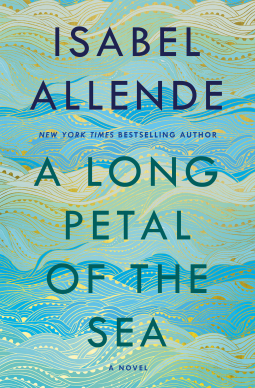FEATURE ARTICLE -
Issue 93: Sep 2023, Reviews and the Arts
Author: Isabel AllendePublisher: BloomsburyReviewer: Stephen Keim
Isabel Allende’s father, Tomas, was a first cousin of the Chilean President, Salvador Allende, who died in the coup of 11 September 1973 led by Augusto Pinochet and sponsored by the United States government.
Isabel was born in 1942 in Lima, Peru, when her father, Tomas, was a second secretary at the Chilean embassy in Lima.
Tomas left his wife and three children, including Isabel, in 1945. After the separation, Isabel’s mother, Francisca, relocated to Santiago, Chile, and, in 1953, Francisca married another Chilean diplomat, Ramon Huidobro and Isabel’s peripatetic life as a child continued.
The title, A Long Petal of the Sea, is a description of Chile, drawing on its long skinny shape and its close relationship with the Pacific Ocean. It is taken from a reference in Pablo Neruda’s writings which is fitting since the famous Chilean poet, diplomat and statesman features a lot in this novel.
There is a video on YouTube in which Isabel Allende discusses a visit to Pablo Neruda’s home in Isla Negra in southern Chile to interview Neruda, one month before the coup. Neruda, however, refused to be interviewed, telling Isabel that she was the worst journalist in the country, she always put herself in the middle of the story and she made things up. But, he said, Neruda loved the way Isabel wrote and she should switch to literature where those characteristics were not faults but virtues.
Neruda’s house was raided on the day of the coup and he became very ill and, just 12 days after the coup, Neruda was dead. Isabel also relates in the video how Neruda’s funeral procession started as a sad and sorry and frightened affair but turned into the first popular protest against the atrocities of those who perpetrated the coup.
Isabel did not take up Neruda’s advice, immediately, and, by the time she started working on her first novel, House of the Spirits, published in 1982, she had forgotten Neruda’s words. Twenty-six best selling books, later, Isabel is the most widely read writer, writing in Spanish. Neruda’s advice was sound.
After the coup, Isabel found herself arranging safe passage from Chile for people on the coup’s death list until she, herself, was listed when she was forced to flee to Venezuela.
Pablo Neruda’s heart was broken and his life was shortened by the coup of 11 September 1973.
Thirty-seven years, earlier, Neruda was in Spain as the Chilean consul when another right wing coup deposed another elected left wing government leading to the Spanish Civil War. Neruda’s heart was broken on this occasion by the murder of Spanish playwright and poet, Federico Garcia Lorca. Garcia Lorca had worked with the Republican elected government to produce and direct plays and to take them to the country where audiences were filled with people who were poor and had never seen a play performed. In the early months of the Civil War, Garcia Lorca was murdered by Francoist forces. So passionate was Neruda’s poetic response to Garcia Lorca’s death, including the poem, I Explain Some Things that he was stripped of his post by the Chilean government.
A Long Petal of the Sea is a work of fiction but it honours a real story and the protagonists in that story. A Long Petal of the Sea links the Spanish Civil War with Pinochet’s coup and finds the common themes between the two events. A Long Petal of the Sea is a complicated love story which spans a number of love stories. And, after documenting oppression cruelty and hate, A Long Petal of the Sea concludes with the triumph of love on a number of levels.
The central historical event of the novel occurs after the end of the Spanish Civil War. Fittingly, Pablo Neruda is at the centre of this event. After urging the Chilean government to do something for the Republican Spanish refugees interned in France, Neruda was commissioned by that government to charter a ship to bring some of those refugees to Chile. Half a million refugees had fled a victorious Franco by walking through the Pyrenees to France. Two thousand people from among those of the refugees who had survived that ordeal were given passage on that ship, the Winnipeg, and, when the ship docked in their new country on the day the Second World War broke out in Europe, a new life beckoned. Some of those refugee/immigrants were still alive when Salvador Allende was elected and some lived to see the murder of Allende and the oppression which followed.
A Long Petal of the Sea tells the story of Victor Dalmau. Largely due to his status as a half-trained medical student, his three years in the bitter battles of the Spanish Civil War saw him working as an assistant to a fearless ambulance driver and, after he had brought a young soldier back to life by massaging his heart through the open wound in the young soldier’s chest, he became an assistant to doctors.
The defeat of the Republicans led to Victor arranging for the pregnant common law wife of Victor’s dead brother, Guillem, to flee through the mountains. Victor and Roser, the pregnant widow who also happened to be a brilliant musician, married in order to qualify for a berth on the Winnipeg and the family of convenience were able to start a new life in Chile where Victor became a famous doctor and supporter of Allende’s government such that, when the coup took place, his place in society and more were at risk.
A Long Petal of the Sea is focused on personal lives and loves but, at a societal level, it does manage to describe the way in which those who are favoured by society will not accept any government, democratically elected or not, that tries to make the lives of those who are not so favoured change for the better. And it describes the way in which, when the right wing oppression comes, it comes with great cruelty and viciousness. And, though it is a quirk of history that the lives of those who travelled on the Winnipeg and survived to see the rise and fall of the Allende government link the Spain of the late 1930s and Chile of the early 1970s, the parallels between the actions of Franco and Pinochet and their respective lieutenants are sufficiently striking to appear to reveal some deeper truths about how the world will always operate.
Isabel Allende is a beautiful creator of prose writing and she depicts her characters’ lives and experiences with great tenderness. Nonetheless, the denouement pages of A Long Petal of the Sea read so much in the style of a family memoir that one feels that the true story on which A Long Petal of the Sea is based is very close in many respects to the narrative of A Long Petal of the Sea, itself.
We do know that, apart from what she may have learned from her interviews of and conversations with Neruda and from conversations with members of her own family, Isabel Allende’s chief informant was Victor Pey, who died in 2018 aged 103. Victor Pey would have been born in 1915 and would have been 24 at the outbreak of the Second World War in 1939 and the right age, a few years earlier to be a half-trained medical student.
But Victor Pey was an engineer, not a doctor. So, we know that Ms Allende did make some effort to fictionalize the story that she was re-telling. One suspects that many of the details are, nonetheless, very close to those of the lives of the people whom her novel honours.
In any event, A Long Petal of the Sea is a beautiful novel that inspires at the same time that it moves to tears.



